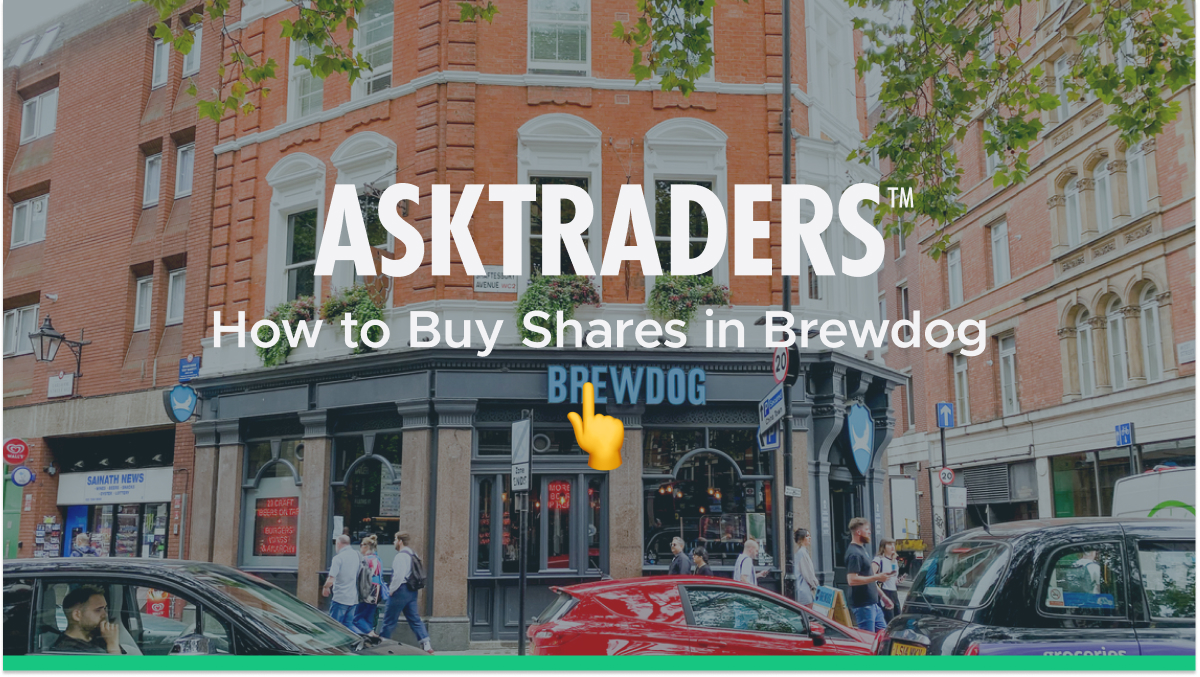The BrewDog brewing company was founded in 2007 by James Watt and Martin Dickie and quickly became one of the most successful craft beer breweries in the world. Based in Ellon, Scotland, the company expanded rapidly and now own breweries in the UK, the US, Australia and Germany. As the company looks like great investment, we look into your option for investing in BrewDog shares.
YOUR CAPITAL IS AT RISK

- BrewDog has repeatedly made headlines for its innovative approach to raising capital.
- The company has announced plans to launch an initial public offering (IPO) on the London Stock Exchange in the near future.
- Heineken is the second-largest brewer in the world, after Anheuser-Busch InBev (AB InBev).
BrewDog’s success can be attributed to a number of factors, including its innovative products, clever marketing strategies, and commitment to sustainability. Its flagship product, Punk IPA, is a popular beer among craft beer enthusiasts and has helped establish BrewDog’s brand identity.
In addition to Punk IPA, BrewDog produces a wide range of other craft beers, including lagers, stouts and sour beers. The company’s commitment to experimentation and innovation is reflected in its products, which often feature unique ingredients and brewing methods.
Financially, BrewDog has also performed well in recent years. In 2020, it reported revenue of £238m ($286m), which was up from £171m ($206m) in 2019. The company has also been valued at over £1bn ($1.2bn), making it one of the most valuable craft beer companies in the world.
Overall, BrewDog’s success in the craft beer industry can be attributed to a combination of innovative products, clever marketing strategies, and a commitment to sustainability. With a growing global presence and a dedicated customer base, BrewDog is well positioned for continued success in the years to come.
Table of contents
Exploring Investment Opportunities in BrewDog
BrewDog has repeatedly made headlines for its innovative approach to raising capital. One of the most notable aspects of the company’s financing strategy is its ‘Equity for Punks’ program, which allows anyone to invest in the company in exchange for shares.
The program has been highly successful, with over 200,000 investors from around the world contributing more than £120m towards the company’s growth.
BrewDog’s equity crowdfunding campaigns have enabled it to maintain control over its operations and avoid the pressure of traditional investors, while still raising significant capital.
In addition to its crowdfunding efforts, the company has also received investments from institutional investors, including TSG Consumer Partners, a private equity firm that acquired a minority stake in BrewDog in 2017.
Investors in BrewDog’s Equity for Punks program have access to a range of benefits, including discounts on beer, invites to exclusive events, and the opportunity to vote on key business decisions. The program is available in select countries, and interested investors can visit the company’s website to learn more about the investment options available in their region.
Apart from the Equity for Punks program, interested investors can also purchase shares in BrewDog through a stockbroker or investment platform that offers access to the Alternative Investment Market (AIM), where BrewDog is currently listed.
However, it is important to note that investing in AIM-listed companies can be high-risk, and investors should conduct thorough research and consult with a financial advisor before making any investment decisions.
While BrewDog is not currently listed on major stock exchanges, the company has announced plans to launch an initial public offering (IPO) on the London Stock Exchange in the near future. This would provide a new opportunity for investors to participate in the growth of this innovative and rapidly expanding craft beer company.
Overall, BrewDog’s unique approach to financing has enabled the company to raise significant capital while maintaining control over its operations. However, as with any investment, it is important to conduct thorough research and understand the risks involved.
YOUR CAPITAL IS AT RISK
The Heineken Company: an Alternative Investment Opportunity
Although you can acquire your own share in BrewDog, the global market does not come short when providing a competitive alternative.
The Heineken Company with its headquarters located in Amsterdam, Netherlands has a portfolio of more than 300 beer and cider brands and operates in more than 190 countries. Heineken is also the second-largest brewer in the world, after Anheuser-Busch InBev (AB InBev).
For the fiscal year 2021, Heineken reported revenue of €26.8bn, a decrease of 1.9% compared to the previous year. The company attributed the decline to the impact of the COVID-19 pandemic on the hospitality industry, which resulted in lower beer consumption in many markets.
Heineken’s operating profit in 2021 was €3.6bn, a decline of 24.7% compared to the previous year, while its net profit in 2021 was €2.2bn, a decrease of 38.8% compared to the previous year.
Heineken’s revenue in Europe, which is the company’s largest market, decreased by 3.1% in 2021 due to the impact of the pandemic on the hospitality industry.
Revenue in the Americas, the company’s second-largest market, decreased by 4.8% due to lower volumes and unfavourable exchange rate movements. However, Heineken’s revenue in the Asia-Pacific region increased by 5.9%, driven by strong growth in Vietnam and China.
To mitigate the impact of the pandemic on its business, Heineken implemented several cost-saving measures in 2021 by reducing its workforce and decreasing its marketing spending. The company also launched new products and packaging formats to meet changing consumer preferences.
Heineken’s innovation efforts also included the launch of its ‘0.0’ non-alcoholic beer in several markets, which helped to offset the decline in sales of its traditional alcoholic beers.
Heineken has a strong balance sheet, with total assets of €52.8bn and total liabilities of €28.8bn as of 31st December 2021. The company’s debt-to-equity ratio was 0.47 in 2021, indicating a conservative financial position. Heineken also generated €3.3bn in cash flow from operations in 2021, and the company paid €1.5bn in dividends to its shareholders.
Overall, Heineken’s financial performance in 2021 was negatively impacted by the COVID-19 pandemic, which resulted in lower beer consumption in many markets. However, the company’s strong balance sheet and cost-saving measures helped to mitigate the impact of the pandemic on its business.
Heineken’s innovation efforts, including the launch of its non-alcoholic beer, suggests that the company is well positioned to adapt to changing consumer preferences while growing its business over the long term.
Heineken is currently listed on the following exchanges:
- Euronext Amsterdam (HEIA)
- OTC Markets in the US (HEINY)
- London Stock Exchange (0O26)
- Xetra in Germany (HINKF)
- SIX Swiss Exchange (HEIN)
YOUR CAPITAL IS AT RISK
Craft Beer vs. Global Brewer: Comparing the Financial Performances of BrewDog and Heineken
BrewDog and Heineken represent two different sides of the beer industry, with BrewDog carving out a niche in the craft beer market, and Heineken operating as a global brewing company with a portfolio that includes hundreds of brands.
Both companies have experienced significant success in their respective segments, but how do their financial performances compare?
BrewDog has been a success story in the craft beer industry, with revenue of £238mn ($286m) in 2020, up from £171m ($205m) in 2019. The company’s innovative products, marketing strategies and commitment to sustainability have helped establish it as a leading player in the industry. BrewDog has also been valued at over £1bn ($1.2bn), making it one of the most valuable craft beer companies in the world.
Investors looking to invest in BrewDog can do so through the company’s Equity for Punks program, which allows anyone to invest in exchange for shares. The program has been highly successful, raising over £120m ($144m) from more than 200,000 investors worldwide. Additional investment from institutional investors, including private equity firm TSG Consumer Partners, has also been received.
In contrast, the Heineken Company is a global brewing powerhouse with a portfolio of over 300 beer and cider brands.
During 2021, the company reported revenue of €26.8bn ($31.7bn), a decrease of 1.9% compared to the previous year, which was attributed to the impact that the COVID-19 pandemic had on the hospitality industry.
However, Heineken’s strong balance sheet and cost-saving measures helped to mitigate the impact of the pandemic on its business.
Investors interested in investing in Heineken can do so through a variety of exchanges, including Euronext Amsterdam, OTC Markets in the US, the London Stock Exchange, Xetra in Germany, and the SIX Swiss Exchange.
In the end, BrewDog and Heineken represent two different investment opportunities in the beer industry.
BrewDog offers individuals an opportunity to invest in a successful and rapidly expanding craft beer company, while Heineken provides exposure to a large and established global brewing company.
As with any investment, it is important to research and understand the risks involved before making any investment decisions.
YOUR CAPITAL IS AT RISK
Final Thoughts
The craft beer industry has experienced tremendous growth in recent years, with BrewDog emerging as a standout player thanks to its innovative products, marketing strategies and sustainability commitments.
On the other hand, the Heineken Company is well-established and operates in over 190 countries. Despite the challenges presented by the COVID-19 pandemic, Heineken successfully weathered the pandemic with cost-saving measures.
Whether you choose to invest in BrewDog or Heineken, remember to invest wisely and keep a watchful eye on the ever-evolving beer market.










